Social and Emotional Competence: A Workplace Conflict Case Study
VerifiedAdded on 2023/06/04
|14
|3649
|281
Case Study
AI Summary
This case study examines real-life workplace conflicts, particularly in a nursing setting, focusing on social and emotional competence. It analyzes conflicts arising from gossip and mistreatment, using theoretical frameworks like classical management and conflict theory to understand their causes and impacts. The analysis includes conflict resolution styles and strategies, emphasizing the importance of communication, respect, and collaboration to mitigate disputes. The study highlights the challenges nurses face, such as verbal abuse and heavy workloads, and suggests resolutions to improve team dynamics and overall workplace environment. The goal is to foster better relationships and ultimately enhance the quality of patient care. Desklib provides similar solved assignments and past papers for students.
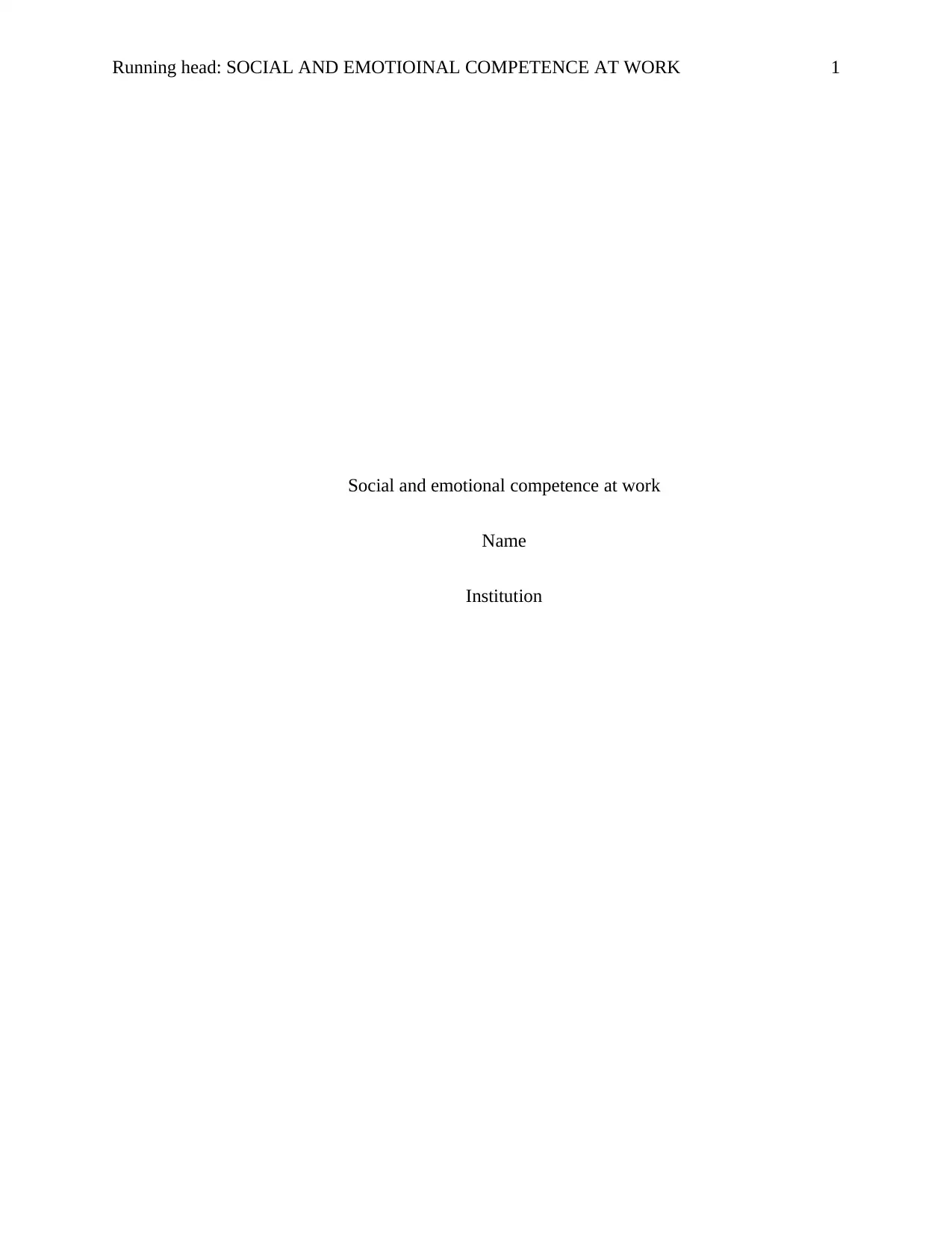
Running head: SOCIAL AND EMOTIOINAL COMPETENCE AT WORK 1
Social and emotional competence at work
Name
Institution
Social and emotional competence at work
Name
Institution
Paraphrase This Document
Need a fresh take? Get an instant paraphrase of this document with our AI Paraphraser
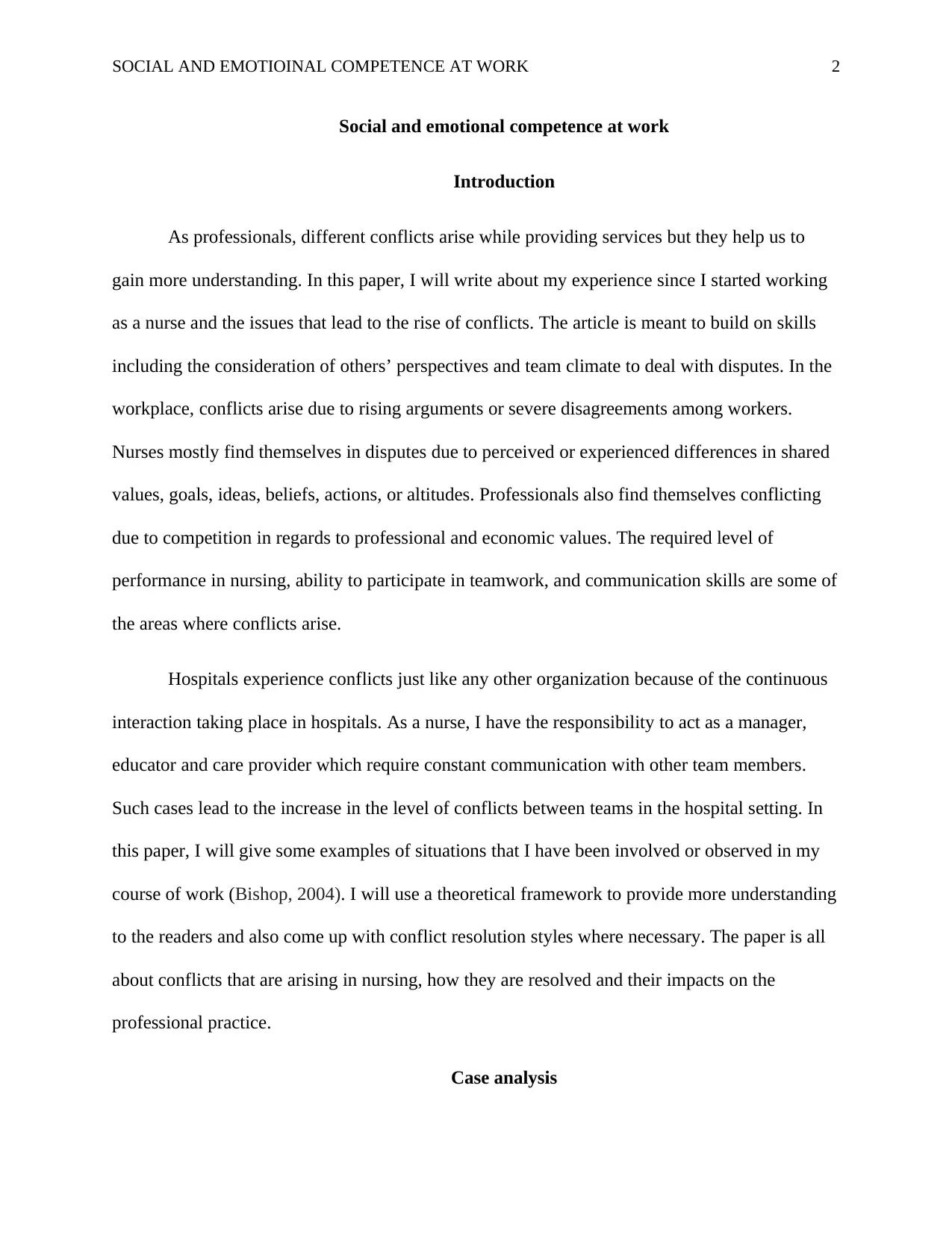
SOCIAL AND EMOTIOINAL COMPETENCE AT WORK 2
Social and emotional competence at work
Introduction
As professionals, different conflicts arise while providing services but they help us to
gain more understanding. In this paper, I will write about my experience since I started working
as a nurse and the issues that lead to the rise of conflicts. The article is meant to build on skills
including the consideration of others’ perspectives and team climate to deal with disputes. In the
workplace, conflicts arise due to rising arguments or severe disagreements among workers.
Nurses mostly find themselves in disputes due to perceived or experienced differences in shared
values, goals, ideas, beliefs, actions, or altitudes. Professionals also find themselves conflicting
due to competition in regards to professional and economic values. The required level of
performance in nursing, ability to participate in teamwork, and communication skills are some of
the areas where conflicts arise.
Hospitals experience conflicts just like any other organization because of the continuous
interaction taking place in hospitals. As a nurse, I have the responsibility to act as a manager,
educator and care provider which require constant communication with other team members.
Such cases lead to the increase in the level of conflicts between teams in the hospital setting. In
this paper, I will give some examples of situations that I have been involved or observed in my
course of work (Bishop, 2004). I will use a theoretical framework to provide more understanding
to the readers and also come up with conflict resolution styles where necessary. The paper is all
about conflicts that are arising in nursing, how they are resolved and their impacts on the
professional practice.
Case analysis
Social and emotional competence at work
Introduction
As professionals, different conflicts arise while providing services but they help us to
gain more understanding. In this paper, I will write about my experience since I started working
as a nurse and the issues that lead to the rise of conflicts. The article is meant to build on skills
including the consideration of others’ perspectives and team climate to deal with disputes. In the
workplace, conflicts arise due to rising arguments or severe disagreements among workers.
Nurses mostly find themselves in disputes due to perceived or experienced differences in shared
values, goals, ideas, beliefs, actions, or altitudes. Professionals also find themselves conflicting
due to competition in regards to professional and economic values. The required level of
performance in nursing, ability to participate in teamwork, and communication skills are some of
the areas where conflicts arise.
Hospitals experience conflicts just like any other organization because of the continuous
interaction taking place in hospitals. As a nurse, I have the responsibility to act as a manager,
educator and care provider which require constant communication with other team members.
Such cases lead to the increase in the level of conflicts between teams in the hospital setting. In
this paper, I will give some examples of situations that I have been involved or observed in my
course of work (Bishop, 2004). I will use a theoretical framework to provide more understanding
to the readers and also come up with conflict resolution styles where necessary. The paper is all
about conflicts that are arising in nursing, how they are resolved and their impacts on the
professional practice.
Case analysis
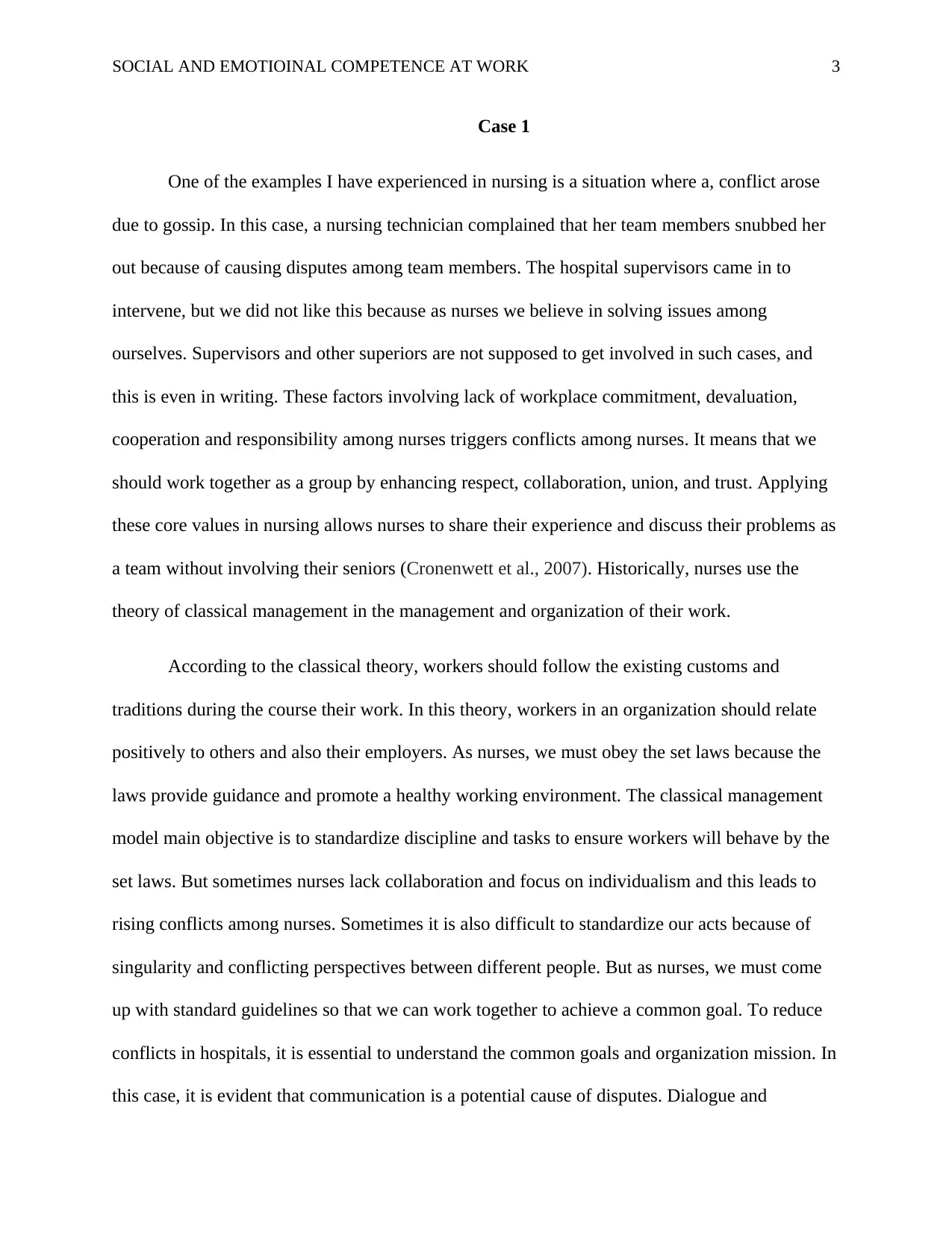
SOCIAL AND EMOTIOINAL COMPETENCE AT WORK 3
Case 1
One of the examples I have experienced in nursing is a situation where a, conflict arose
due to gossip. In this case, a nursing technician complained that her team members snubbed her
out because of causing disputes among team members. The hospital supervisors came in to
intervene, but we did not like this because as nurses we believe in solving issues among
ourselves. Supervisors and other superiors are not supposed to get involved in such cases, and
this is even in writing. These factors involving lack of workplace commitment, devaluation,
cooperation and responsibility among nurses triggers conflicts among nurses. It means that we
should work together as a group by enhancing respect, collaboration, union, and trust. Applying
these core values in nursing allows nurses to share their experience and discuss their problems as
a team without involving their seniors (Cronenwett et al., 2007). Historically, nurses use the
theory of classical management in the management and organization of their work.
According to the classical theory, workers should follow the existing customs and
traditions during the course their work. In this theory, workers in an organization should relate
positively to others and also their employers. As nurses, we must obey the set laws because the
laws provide guidance and promote a healthy working environment. The classical management
model main objective is to standardize discipline and tasks to ensure workers will behave by the
set laws. But sometimes nurses lack collaboration and focus on individualism and this leads to
rising conflicts among nurses. Sometimes it is also difficult to standardize our acts because of
singularity and conflicting perspectives between different people. But as nurses, we must come
up with standard guidelines so that we can work together to achieve a common goal. To reduce
conflicts in hospitals, it is essential to understand the common goals and organization mission. In
this case, it is evident that communication is a potential cause of disputes. Dialogue and
Case 1
One of the examples I have experienced in nursing is a situation where a, conflict arose
due to gossip. In this case, a nursing technician complained that her team members snubbed her
out because of causing disputes among team members. The hospital supervisors came in to
intervene, but we did not like this because as nurses we believe in solving issues among
ourselves. Supervisors and other superiors are not supposed to get involved in such cases, and
this is even in writing. These factors involving lack of workplace commitment, devaluation,
cooperation and responsibility among nurses triggers conflicts among nurses. It means that we
should work together as a group by enhancing respect, collaboration, union, and trust. Applying
these core values in nursing allows nurses to share their experience and discuss their problems as
a team without involving their seniors (Cronenwett et al., 2007). Historically, nurses use the
theory of classical management in the management and organization of their work.
According to the classical theory, workers should follow the existing customs and
traditions during the course their work. In this theory, workers in an organization should relate
positively to others and also their employers. As nurses, we must obey the set laws because the
laws provide guidance and promote a healthy working environment. The classical management
model main objective is to standardize discipline and tasks to ensure workers will behave by the
set laws. But sometimes nurses lack collaboration and focus on individualism and this leads to
rising conflicts among nurses. Sometimes it is also difficult to standardize our acts because of
singularity and conflicting perspectives between different people. But as nurses, we must come
up with standard guidelines so that we can work together to achieve a common goal. To reduce
conflicts in hospitals, it is essential to understand the common goals and organization mission. In
this case, it is evident that communication is a potential cause of disputes. Dialogue and
⊘ This is a preview!⊘
Do you want full access?
Subscribe today to unlock all pages.

Trusted by 1+ million students worldwide
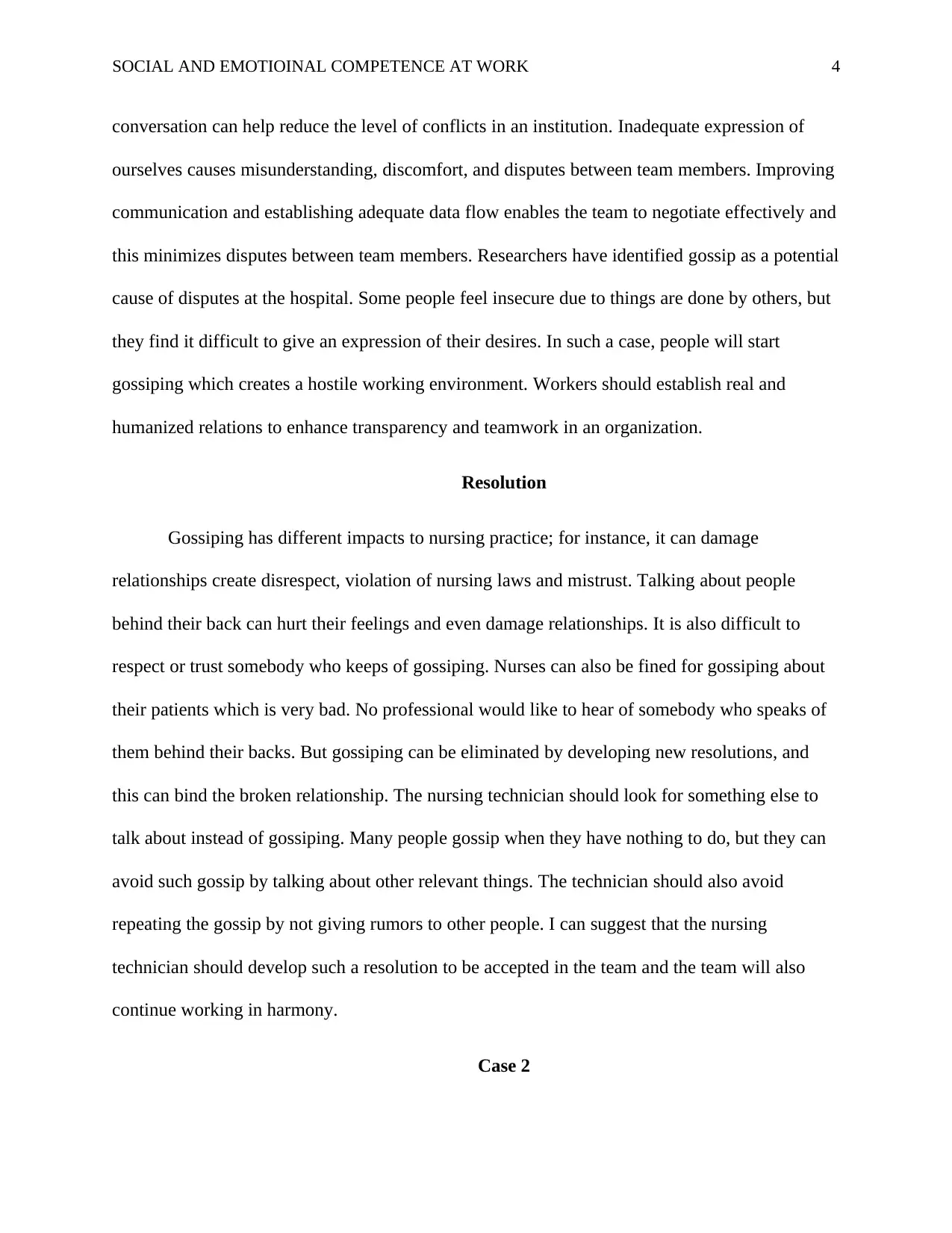
SOCIAL AND EMOTIOINAL COMPETENCE AT WORK 4
conversation can help reduce the level of conflicts in an institution. Inadequate expression of
ourselves causes misunderstanding, discomfort, and disputes between team members. Improving
communication and establishing adequate data flow enables the team to negotiate effectively and
this minimizes disputes between team members. Researchers have identified gossip as a potential
cause of disputes at the hospital. Some people feel insecure due to things are done by others, but
they find it difficult to give an expression of their desires. In such a case, people will start
gossiping which creates a hostile working environment. Workers should establish real and
humanized relations to enhance transparency and teamwork in an organization.
Resolution
Gossiping has different impacts to nursing practice; for instance, it can damage
relationships create disrespect, violation of nursing laws and mistrust. Talking about people
behind their back can hurt their feelings and even damage relationships. It is also difficult to
respect or trust somebody who keeps of gossiping. Nurses can also be fined for gossiping about
their patients which is very bad. No professional would like to hear of somebody who speaks of
them behind their backs. But gossiping can be eliminated by developing new resolutions, and
this can bind the broken relationship. The nursing technician should look for something else to
talk about instead of gossiping. Many people gossip when they have nothing to do, but they can
avoid such gossip by talking about other relevant things. The technician should also avoid
repeating the gossip by not giving rumors to other people. I can suggest that the nursing
technician should develop such a resolution to be accepted in the team and the team will also
continue working in harmony.
Case 2
conversation can help reduce the level of conflicts in an institution. Inadequate expression of
ourselves causes misunderstanding, discomfort, and disputes between team members. Improving
communication and establishing adequate data flow enables the team to negotiate effectively and
this minimizes disputes between team members. Researchers have identified gossip as a potential
cause of disputes at the hospital. Some people feel insecure due to things are done by others, but
they find it difficult to give an expression of their desires. In such a case, people will start
gossiping which creates a hostile working environment. Workers should establish real and
humanized relations to enhance transparency and teamwork in an organization.
Resolution
Gossiping has different impacts to nursing practice; for instance, it can damage
relationships create disrespect, violation of nursing laws and mistrust. Talking about people
behind their back can hurt their feelings and even damage relationships. It is also difficult to
respect or trust somebody who keeps of gossiping. Nurses can also be fined for gossiping about
their patients which is very bad. No professional would like to hear of somebody who speaks of
them behind their backs. But gossiping can be eliminated by developing new resolutions, and
this can bind the broken relationship. The nursing technician should look for something else to
talk about instead of gossiping. Many people gossip when they have nothing to do, but they can
avoid such gossip by talking about other relevant things. The technician should also avoid
repeating the gossip by not giving rumors to other people. I can suggest that the nursing
technician should develop such a resolution to be accepted in the team and the team will also
continue working in harmony.
Case 2
Paraphrase This Document
Need a fresh take? Get an instant paraphrase of this document with our AI Paraphraser
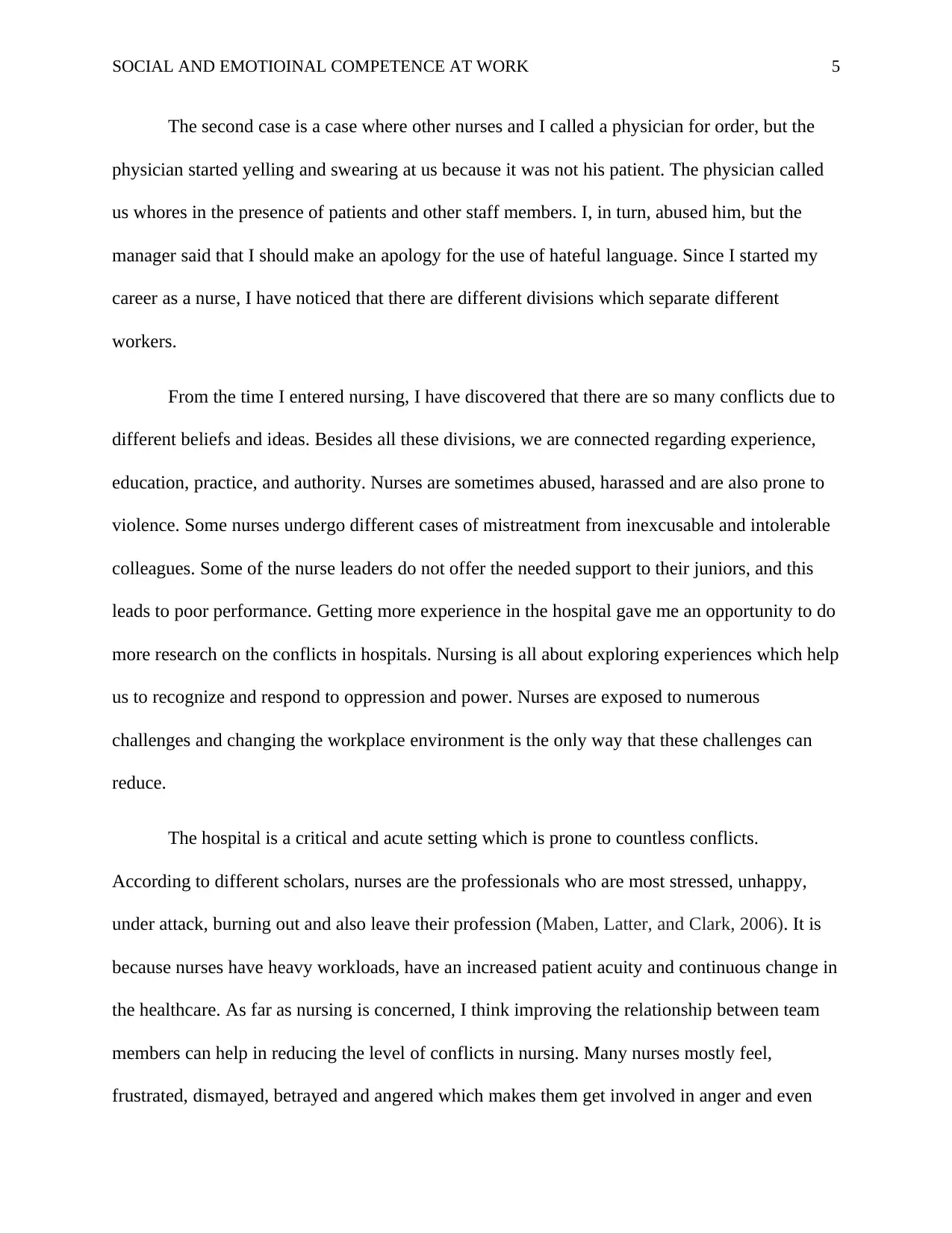
SOCIAL AND EMOTIOINAL COMPETENCE AT WORK 5
The second case is a case where other nurses and I called a physician for order, but the
physician started yelling and swearing at us because it was not his patient. The physician called
us whores in the presence of patients and other staff members. I, in turn, abused him, but the
manager said that I should make an apology for the use of hateful language. Since I started my
career as a nurse, I have noticed that there are different divisions which separate different
workers.
From the time I entered nursing, I have discovered that there are so many conflicts due to
different beliefs and ideas. Besides all these divisions, we are connected regarding experience,
education, practice, and authority. Nurses are sometimes abused, harassed and are also prone to
violence. Some nurses undergo different cases of mistreatment from inexcusable and intolerable
colleagues. Some of the nurse leaders do not offer the needed support to their juniors, and this
leads to poor performance. Getting more experience in the hospital gave me an opportunity to do
more research on the conflicts in hospitals. Nursing is all about exploring experiences which help
us to recognize and respond to oppression and power. Nurses are exposed to numerous
challenges and changing the workplace environment is the only way that these challenges can
reduce.
The hospital is a critical and acute setting which is prone to countless conflicts.
According to different scholars, nurses are the professionals who are most stressed, unhappy,
under attack, burning out and also leave their profession (Maben, Latter, and Clark, 2006). It is
because nurses have heavy workloads, have an increased patient acuity and continuous change in
the healthcare. As far as nursing is concerned, I think improving the relationship between team
members can help in reducing the level of conflicts in nursing. Many nurses mostly feel,
frustrated, dismayed, betrayed and angered which makes them get involved in anger and even
The second case is a case where other nurses and I called a physician for order, but the
physician started yelling and swearing at us because it was not his patient. The physician called
us whores in the presence of patients and other staff members. I, in turn, abused him, but the
manager said that I should make an apology for the use of hateful language. Since I started my
career as a nurse, I have noticed that there are different divisions which separate different
workers.
From the time I entered nursing, I have discovered that there are so many conflicts due to
different beliefs and ideas. Besides all these divisions, we are connected regarding experience,
education, practice, and authority. Nurses are sometimes abused, harassed and are also prone to
violence. Some nurses undergo different cases of mistreatment from inexcusable and intolerable
colleagues. Some of the nurse leaders do not offer the needed support to their juniors, and this
leads to poor performance. Getting more experience in the hospital gave me an opportunity to do
more research on the conflicts in hospitals. Nursing is all about exploring experiences which help
us to recognize and respond to oppression and power. Nurses are exposed to numerous
challenges and changing the workplace environment is the only way that these challenges can
reduce.
The hospital is a critical and acute setting which is prone to countless conflicts.
According to different scholars, nurses are the professionals who are most stressed, unhappy,
under attack, burning out and also leave their profession (Maben, Latter, and Clark, 2006). It is
because nurses have heavy workloads, have an increased patient acuity and continuous change in
the healthcare. As far as nursing is concerned, I think improving the relationship between team
members can help in reducing the level of conflicts in nursing. Many nurses mostly feel,
frustrated, dismayed, betrayed and angered which makes them get involved in anger and even
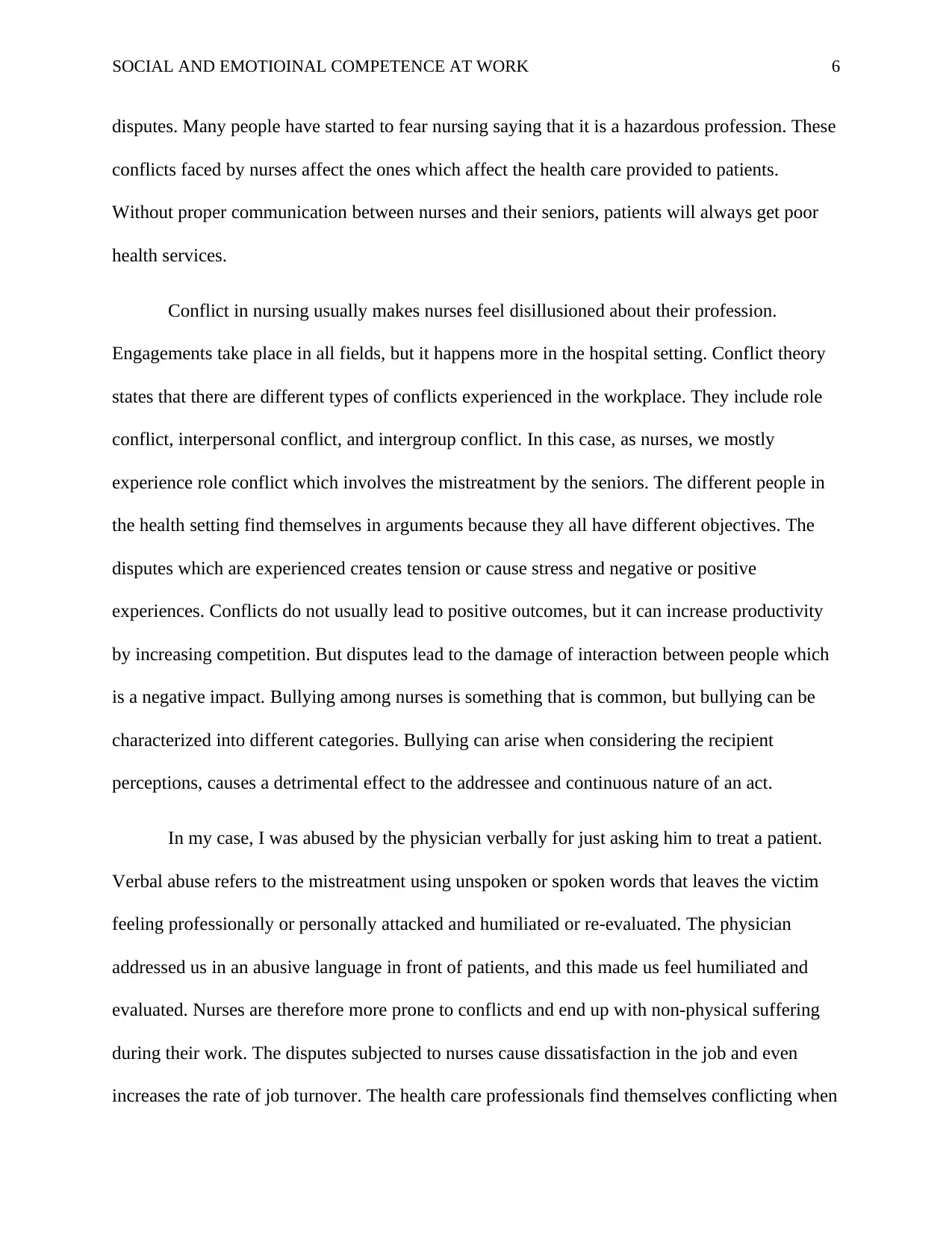
SOCIAL AND EMOTIOINAL COMPETENCE AT WORK 6
disputes. Many people have started to fear nursing saying that it is a hazardous profession. These
conflicts faced by nurses affect the ones which affect the health care provided to patients.
Without proper communication between nurses and their seniors, patients will always get poor
health services.
Conflict in nursing usually makes nurses feel disillusioned about their profession.
Engagements take place in all fields, but it happens more in the hospital setting. Conflict theory
states that there are different types of conflicts experienced in the workplace. They include role
conflict, interpersonal conflict, and intergroup conflict. In this case, as nurses, we mostly
experience role conflict which involves the mistreatment by the seniors. The different people in
the health setting find themselves in arguments because they all have different objectives. The
disputes which are experienced creates tension or cause stress and negative or positive
experiences. Conflicts do not usually lead to positive outcomes, but it can increase productivity
by increasing competition. But disputes lead to the damage of interaction between people which
is a negative impact. Bullying among nurses is something that is common, but bullying can be
characterized into different categories. Bullying can arise when considering the recipient
perceptions, causes a detrimental effect to the addressee and continuous nature of an act.
In my case, I was abused by the physician verbally for just asking him to treat a patient.
Verbal abuse refers to the mistreatment using unspoken or spoken words that leaves the victim
feeling professionally or personally attacked and humiliated or re-evaluated. The physician
addressed us in an abusive language in front of patients, and this made us feel humiliated and
evaluated. Nurses are therefore more prone to conflicts and end up with non-physical suffering
during their work. The disputes subjected to nurses cause dissatisfaction in the job and even
increases the rate of job turnover. The health care professionals find themselves conflicting when
disputes. Many people have started to fear nursing saying that it is a hazardous profession. These
conflicts faced by nurses affect the ones which affect the health care provided to patients.
Without proper communication between nurses and their seniors, patients will always get poor
health services.
Conflict in nursing usually makes nurses feel disillusioned about their profession.
Engagements take place in all fields, but it happens more in the hospital setting. Conflict theory
states that there are different types of conflicts experienced in the workplace. They include role
conflict, interpersonal conflict, and intergroup conflict. In this case, as nurses, we mostly
experience role conflict which involves the mistreatment by the seniors. The different people in
the health setting find themselves in arguments because they all have different objectives. The
disputes which are experienced creates tension or cause stress and negative or positive
experiences. Conflicts do not usually lead to positive outcomes, but it can increase productivity
by increasing competition. But disputes lead to the damage of interaction between people which
is a negative impact. Bullying among nurses is something that is common, but bullying can be
characterized into different categories. Bullying can arise when considering the recipient
perceptions, causes a detrimental effect to the addressee and continuous nature of an act.
In my case, I was abused by the physician verbally for just asking him to treat a patient.
Verbal abuse refers to the mistreatment using unspoken or spoken words that leaves the victim
feeling professionally or personally attacked and humiliated or re-evaluated. The physician
addressed us in an abusive language in front of patients, and this made us feel humiliated and
evaluated. Nurses are therefore more prone to conflicts and end up with non-physical suffering
during their work. The disputes subjected to nurses cause dissatisfaction in the job and even
increases the rate of job turnover. The health care professionals find themselves conflicting when
⊘ This is a preview!⊘
Do you want full access?
Subscribe today to unlock all pages.

Trusted by 1+ million students worldwide
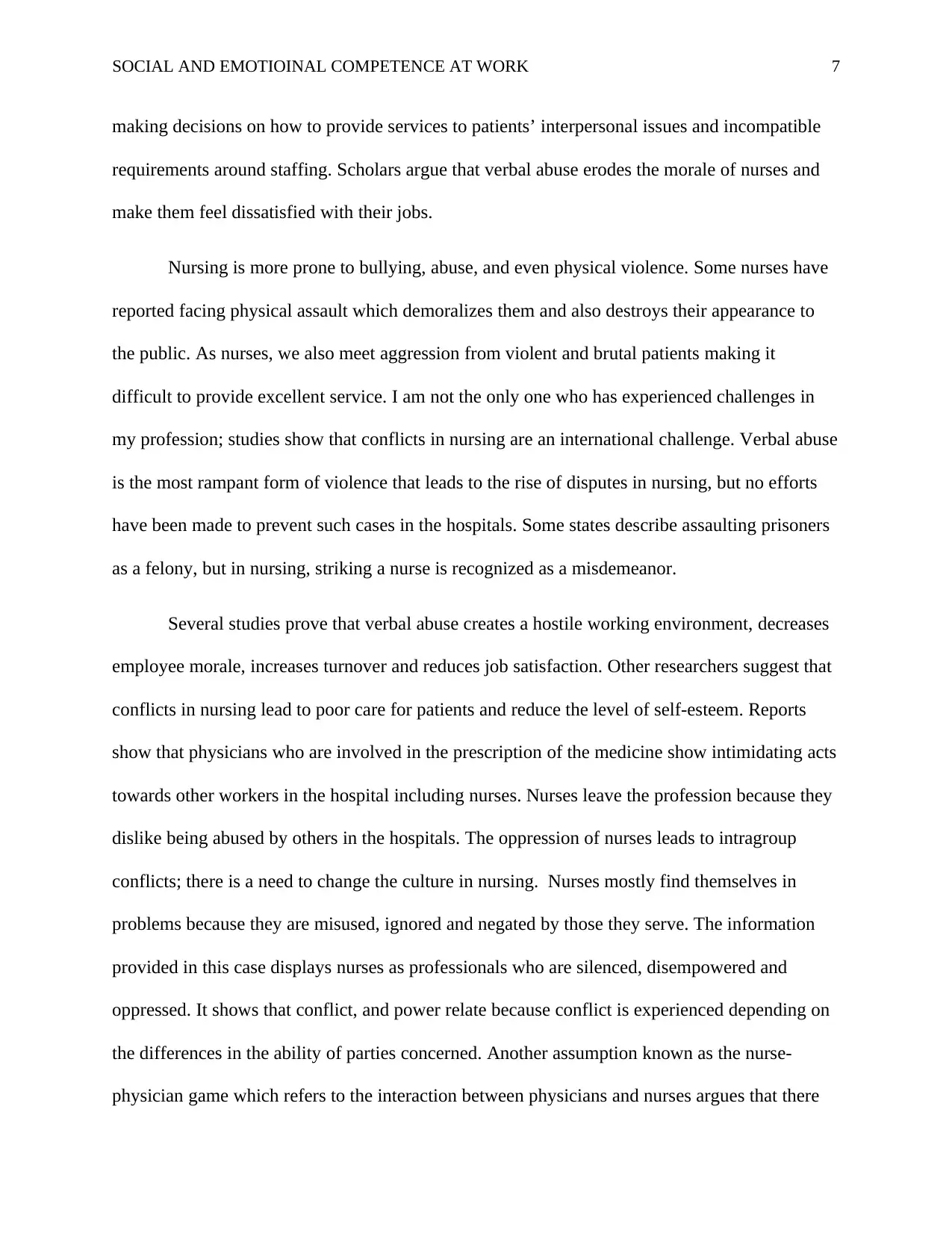
SOCIAL AND EMOTIOINAL COMPETENCE AT WORK 7
making decisions on how to provide services to patients’ interpersonal issues and incompatible
requirements around staffing. Scholars argue that verbal abuse erodes the morale of nurses and
make them feel dissatisfied with their jobs.
Nursing is more prone to bullying, abuse, and even physical violence. Some nurses have
reported facing physical assault which demoralizes them and also destroys their appearance to
the public. As nurses, we also meet aggression from violent and brutal patients making it
difficult to provide excellent service. I am not the only one who has experienced challenges in
my profession; studies show that conflicts in nursing are an international challenge. Verbal abuse
is the most rampant form of violence that leads to the rise of disputes in nursing, but no efforts
have been made to prevent such cases in the hospitals. Some states describe assaulting prisoners
as a felony, but in nursing, striking a nurse is recognized as a misdemeanor.
Several studies prove that verbal abuse creates a hostile working environment, decreases
employee morale, increases turnover and reduces job satisfaction. Other researchers suggest that
conflicts in nursing lead to poor care for patients and reduce the level of self-esteem. Reports
show that physicians who are involved in the prescription of the medicine show intimidating acts
towards other workers in the hospital including nurses. Nurses leave the profession because they
dislike being abused by others in the hospitals. The oppression of nurses leads to intragroup
conflicts; there is a need to change the culture in nursing. Nurses mostly find themselves in
problems because they are misused, ignored and negated by those they serve. The information
provided in this case displays nurses as professionals who are silenced, disempowered and
oppressed. It shows that conflict, and power relate because conflict is experienced depending on
the differences in the ability of parties concerned. Another assumption known as the nurse-
physician game which refers to the interaction between physicians and nurses argues that there
making decisions on how to provide services to patients’ interpersonal issues and incompatible
requirements around staffing. Scholars argue that verbal abuse erodes the morale of nurses and
make them feel dissatisfied with their jobs.
Nursing is more prone to bullying, abuse, and even physical violence. Some nurses have
reported facing physical assault which demoralizes them and also destroys their appearance to
the public. As nurses, we also meet aggression from violent and brutal patients making it
difficult to provide excellent service. I am not the only one who has experienced challenges in
my profession; studies show that conflicts in nursing are an international challenge. Verbal abuse
is the most rampant form of violence that leads to the rise of disputes in nursing, but no efforts
have been made to prevent such cases in the hospitals. Some states describe assaulting prisoners
as a felony, but in nursing, striking a nurse is recognized as a misdemeanor.
Several studies prove that verbal abuse creates a hostile working environment, decreases
employee morale, increases turnover and reduces job satisfaction. Other researchers suggest that
conflicts in nursing lead to poor care for patients and reduce the level of self-esteem. Reports
show that physicians who are involved in the prescription of the medicine show intimidating acts
towards other workers in the hospital including nurses. Nurses leave the profession because they
dislike being abused by others in the hospitals. The oppression of nurses leads to intragroup
conflicts; there is a need to change the culture in nursing. Nurses mostly find themselves in
problems because they are misused, ignored and negated by those they serve. The information
provided in this case displays nurses as professionals who are silenced, disempowered and
oppressed. It shows that conflict, and power relate because conflict is experienced depending on
the differences in the ability of parties concerned. Another assumption known as the nurse-
physician game which refers to the interaction between physicians and nurses argues that there
Paraphrase This Document
Need a fresh take? Get an instant paraphrase of this document with our AI Paraphraser
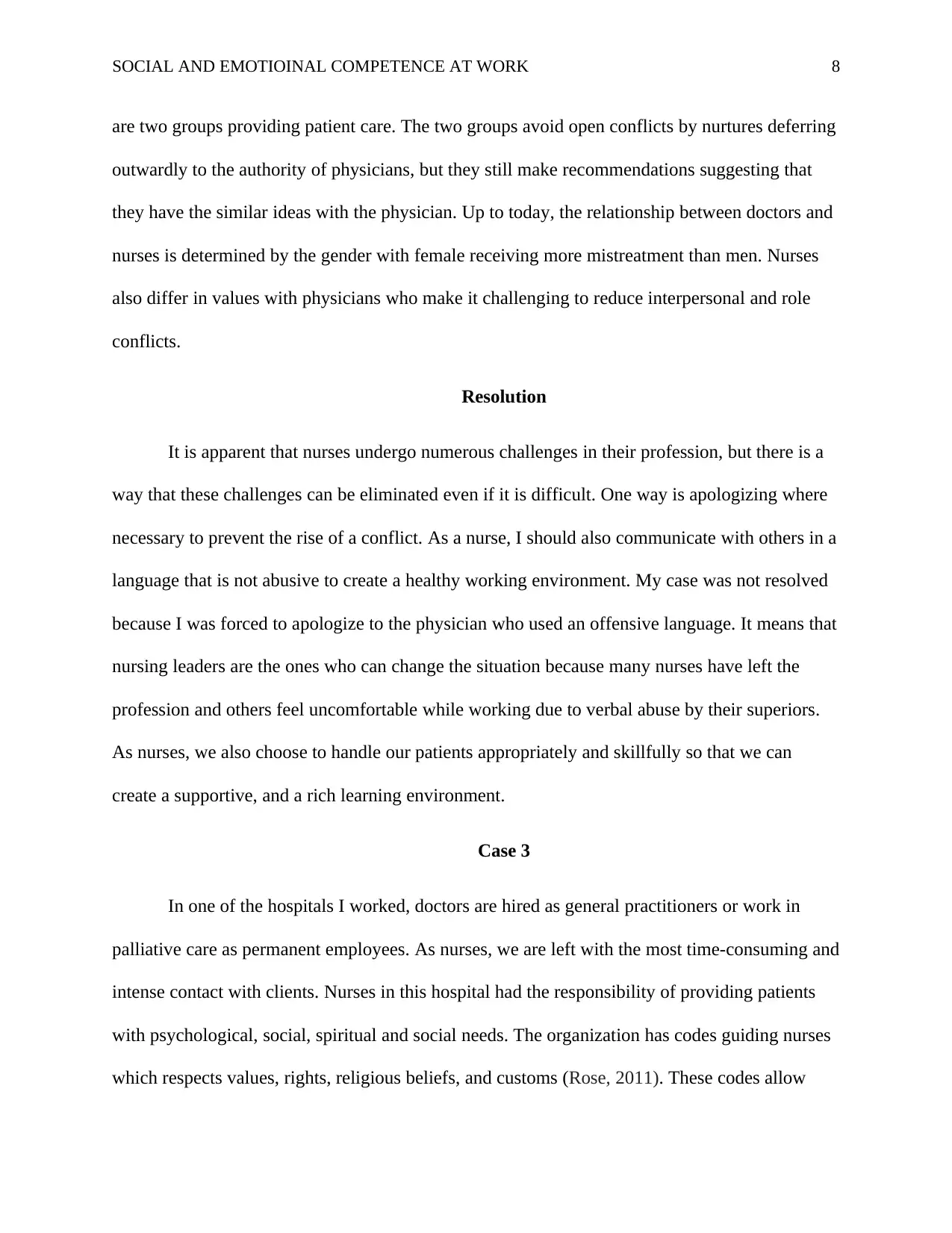
SOCIAL AND EMOTIOINAL COMPETENCE AT WORK 8
are two groups providing patient care. The two groups avoid open conflicts by nurtures deferring
outwardly to the authority of physicians, but they still make recommendations suggesting that
they have the similar ideas with the physician. Up to today, the relationship between doctors and
nurses is determined by the gender with female receiving more mistreatment than men. Nurses
also differ in values with physicians who make it challenging to reduce interpersonal and role
conflicts.
Resolution
It is apparent that nurses undergo numerous challenges in their profession, but there is a
way that these challenges can be eliminated even if it is difficult. One way is apologizing where
necessary to prevent the rise of a conflict. As a nurse, I should also communicate with others in a
language that is not abusive to create a healthy working environment. My case was not resolved
because I was forced to apologize to the physician who used an offensive language. It means that
nursing leaders are the ones who can change the situation because many nurses have left the
profession and others feel uncomfortable while working due to verbal abuse by their superiors.
As nurses, we also choose to handle our patients appropriately and skillfully so that we can
create a supportive, and a rich learning environment.
Case 3
In one of the hospitals I worked, doctors are hired as general practitioners or work in
palliative care as permanent employees. As nurses, we are left with the most time-consuming and
intense contact with clients. Nurses in this hospital had the responsibility of providing patients
with psychological, social, spiritual and social needs. The organization has codes guiding nurses
which respects values, rights, religious beliefs, and customs (Rose, 2011). These codes allow
are two groups providing patient care. The two groups avoid open conflicts by nurtures deferring
outwardly to the authority of physicians, but they still make recommendations suggesting that
they have the similar ideas with the physician. Up to today, the relationship between doctors and
nurses is determined by the gender with female receiving more mistreatment than men. Nurses
also differ in values with physicians who make it challenging to reduce interpersonal and role
conflicts.
Resolution
It is apparent that nurses undergo numerous challenges in their profession, but there is a
way that these challenges can be eliminated even if it is difficult. One way is apologizing where
necessary to prevent the rise of a conflict. As a nurse, I should also communicate with others in a
language that is not abusive to create a healthy working environment. My case was not resolved
because I was forced to apologize to the physician who used an offensive language. It means that
nursing leaders are the ones who can change the situation because many nurses have left the
profession and others feel uncomfortable while working due to verbal abuse by their superiors.
As nurses, we also choose to handle our patients appropriately and skillfully so that we can
create a supportive, and a rich learning environment.
Case 3
In one of the hospitals I worked, doctors are hired as general practitioners or work in
palliative care as permanent employees. As nurses, we are left with the most time-consuming and
intense contact with clients. Nurses in this hospital had the responsibility of providing patients
with psychological, social, spiritual and social needs. The organization has codes guiding nurses
which respects values, rights, religious beliefs, and customs (Rose, 2011). These codes allow
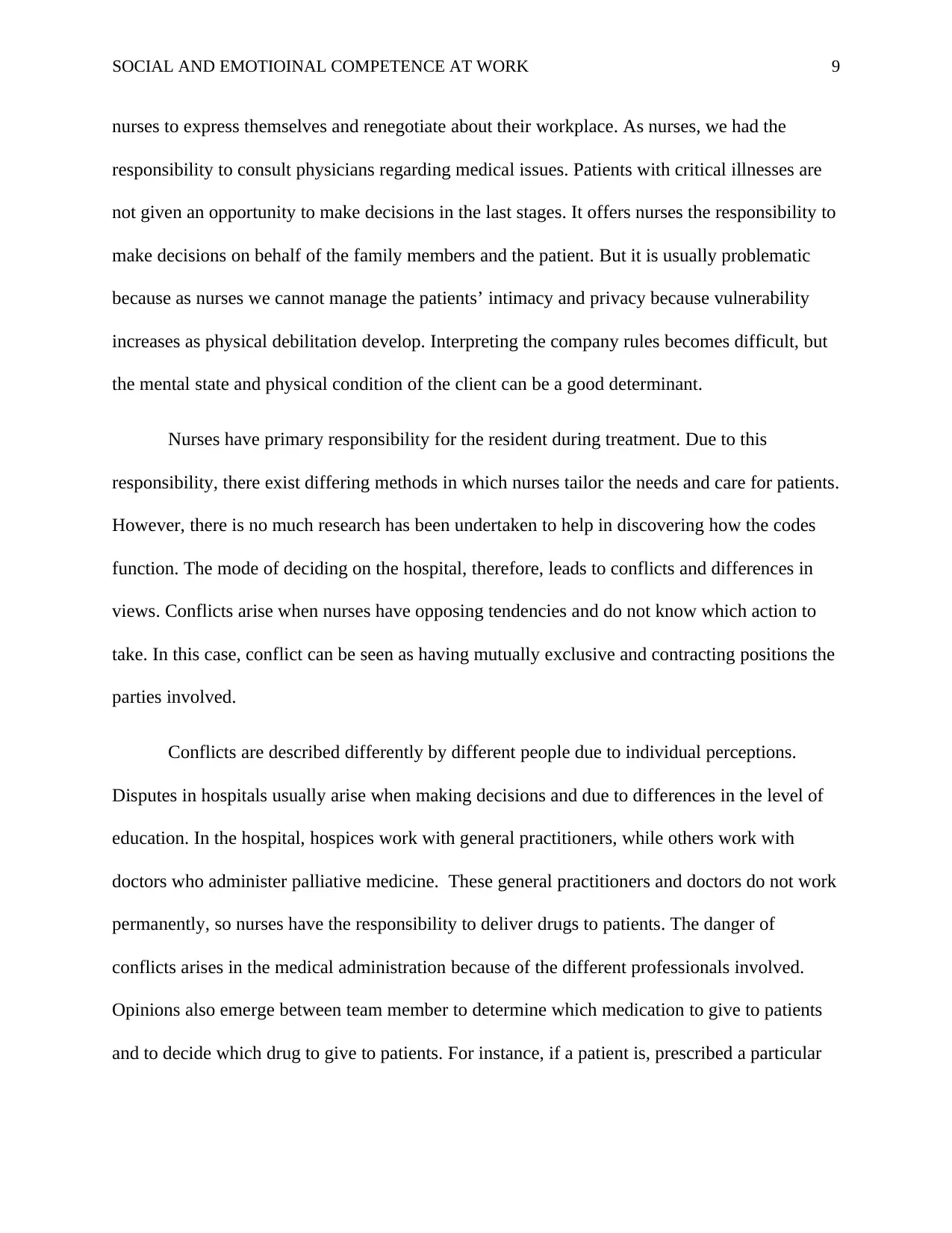
SOCIAL AND EMOTIOINAL COMPETENCE AT WORK 9
nurses to express themselves and renegotiate about their workplace. As nurses, we had the
responsibility to consult physicians regarding medical issues. Patients with critical illnesses are
not given an opportunity to make decisions in the last stages. It offers nurses the responsibility to
make decisions on behalf of the family members and the patient. But it is usually problematic
because as nurses we cannot manage the patients’ intimacy and privacy because vulnerability
increases as physical debilitation develop. Interpreting the company rules becomes difficult, but
the mental state and physical condition of the client can be a good determinant.
Nurses have primary responsibility for the resident during treatment. Due to this
responsibility, there exist differing methods in which nurses tailor the needs and care for patients.
However, there is no much research has been undertaken to help in discovering how the codes
function. The mode of deciding on the hospital, therefore, leads to conflicts and differences in
views. Conflicts arise when nurses have opposing tendencies and do not know which action to
take. In this case, conflict can be seen as having mutually exclusive and contracting positions the
parties involved.
Conflicts are described differently by different people due to individual perceptions.
Disputes in hospitals usually arise when making decisions and due to differences in the level of
education. In the hospital, hospices work with general practitioners, while others work with
doctors who administer palliative medicine. These general practitioners and doctors do not work
permanently, so nurses have the responsibility to deliver drugs to patients. The danger of
conflicts arises in the medical administration because of the different professionals involved.
Opinions also emerge between team member to determine which medication to give to patients
and to decide which drug to give to patients. For instance, if a patient is, prescribed a particular
nurses to express themselves and renegotiate about their workplace. As nurses, we had the
responsibility to consult physicians regarding medical issues. Patients with critical illnesses are
not given an opportunity to make decisions in the last stages. It offers nurses the responsibility to
make decisions on behalf of the family members and the patient. But it is usually problematic
because as nurses we cannot manage the patients’ intimacy and privacy because vulnerability
increases as physical debilitation develop. Interpreting the company rules becomes difficult, but
the mental state and physical condition of the client can be a good determinant.
Nurses have primary responsibility for the resident during treatment. Due to this
responsibility, there exist differing methods in which nurses tailor the needs and care for patients.
However, there is no much research has been undertaken to help in discovering how the codes
function. The mode of deciding on the hospital, therefore, leads to conflicts and differences in
views. Conflicts arise when nurses have opposing tendencies and do not know which action to
take. In this case, conflict can be seen as having mutually exclusive and contracting positions the
parties involved.
Conflicts are described differently by different people due to individual perceptions.
Disputes in hospitals usually arise when making decisions and due to differences in the level of
education. In the hospital, hospices work with general practitioners, while others work with
doctors who administer palliative medicine. These general practitioners and doctors do not work
permanently, so nurses have the responsibility to deliver drugs to patients. The danger of
conflicts arises in the medical administration because of the different professionals involved.
Opinions also emerge between team member to determine which medication to give to patients
and to decide which drug to give to patients. For instance, if a patient is, prescribed a particular
⊘ This is a preview!⊘
Do you want full access?
Subscribe today to unlock all pages.

Trusted by 1+ million students worldwide
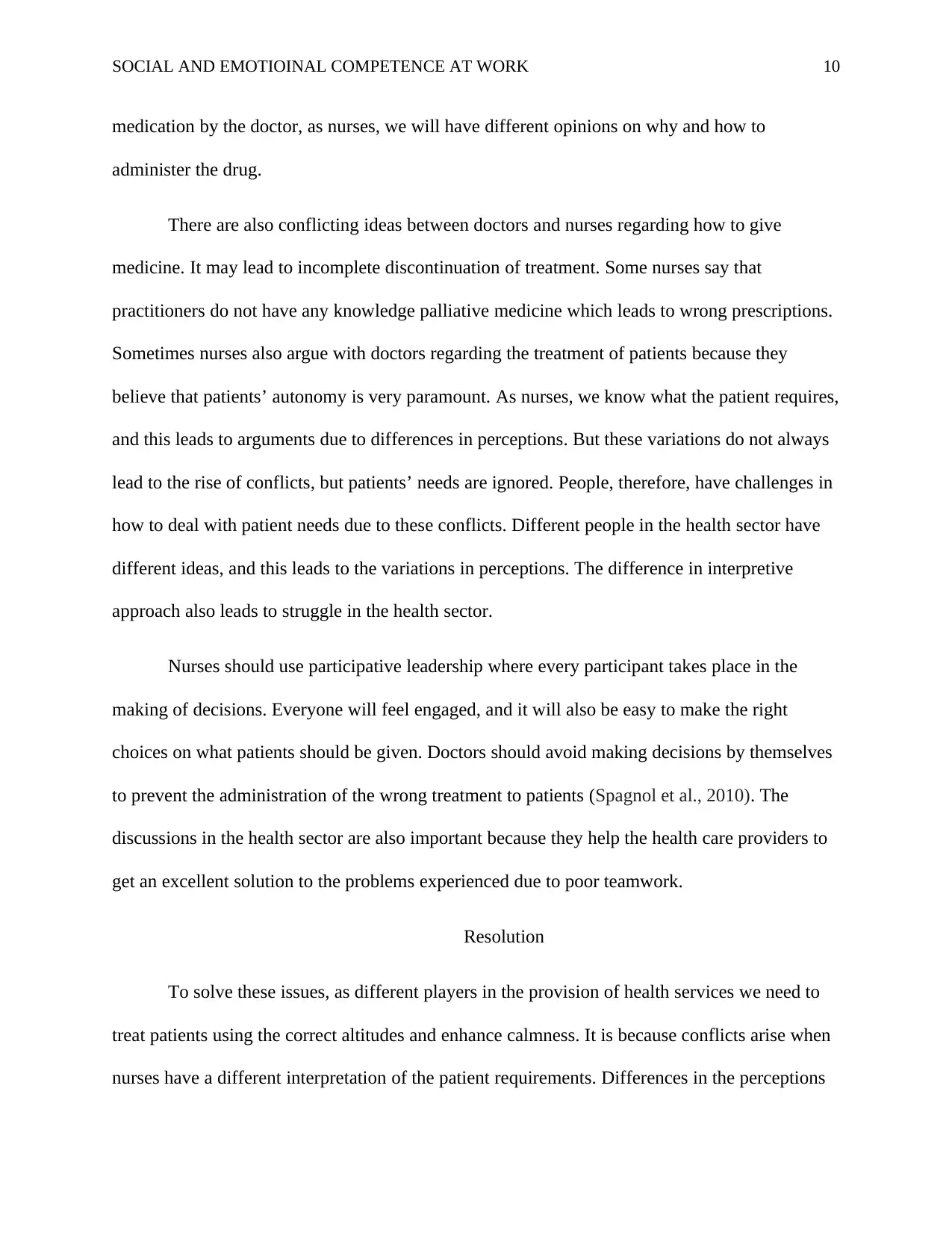
SOCIAL AND EMOTIOINAL COMPETENCE AT WORK 10
medication by the doctor, as nurses, we will have different opinions on why and how to
administer the drug.
There are also conflicting ideas between doctors and nurses regarding how to give
medicine. It may lead to incomplete discontinuation of treatment. Some nurses say that
practitioners do not have any knowledge palliative medicine which leads to wrong prescriptions.
Sometimes nurses also argue with doctors regarding the treatment of patients because they
believe that patients’ autonomy is very paramount. As nurses, we know what the patient requires,
and this leads to arguments due to differences in perceptions. But these variations do not always
lead to the rise of conflicts, but patients’ needs are ignored. People, therefore, have challenges in
how to deal with patient needs due to these conflicts. Different people in the health sector have
different ideas, and this leads to the variations in perceptions. The difference in interpretive
approach also leads to struggle in the health sector.
Nurses should use participative leadership where every participant takes place in the
making of decisions. Everyone will feel engaged, and it will also be easy to make the right
choices on what patients should be given. Doctors should avoid making decisions by themselves
to prevent the administration of the wrong treatment to patients (Spagnol et al., 2010). The
discussions in the health sector are also important because they help the health care providers to
get an excellent solution to the problems experienced due to poor teamwork.
Resolution
To solve these issues, as different players in the provision of health services we need to
treat patients using the correct altitudes and enhance calmness. It is because conflicts arise when
nurses have a different interpretation of the patient requirements. Differences in the perceptions
medication by the doctor, as nurses, we will have different opinions on why and how to
administer the drug.
There are also conflicting ideas between doctors and nurses regarding how to give
medicine. It may lead to incomplete discontinuation of treatment. Some nurses say that
practitioners do not have any knowledge palliative medicine which leads to wrong prescriptions.
Sometimes nurses also argue with doctors regarding the treatment of patients because they
believe that patients’ autonomy is very paramount. As nurses, we know what the patient requires,
and this leads to arguments due to differences in perceptions. But these variations do not always
lead to the rise of conflicts, but patients’ needs are ignored. People, therefore, have challenges in
how to deal with patient needs due to these conflicts. Different people in the health sector have
different ideas, and this leads to the variations in perceptions. The difference in interpretive
approach also leads to struggle in the health sector.
Nurses should use participative leadership where every participant takes place in the
making of decisions. Everyone will feel engaged, and it will also be easy to make the right
choices on what patients should be given. Doctors should avoid making decisions by themselves
to prevent the administration of the wrong treatment to patients (Spagnol et al., 2010). The
discussions in the health sector are also important because they help the health care providers to
get an excellent solution to the problems experienced due to poor teamwork.
Resolution
To solve these issues, as different players in the provision of health services we need to
treat patients using the correct altitudes and enhance calmness. It is because conflicts arise when
nurses have a different interpretation of the patient requirements. Differences in the perceptions
Paraphrase This Document
Need a fresh take? Get an instant paraphrase of this document with our AI Paraphraser
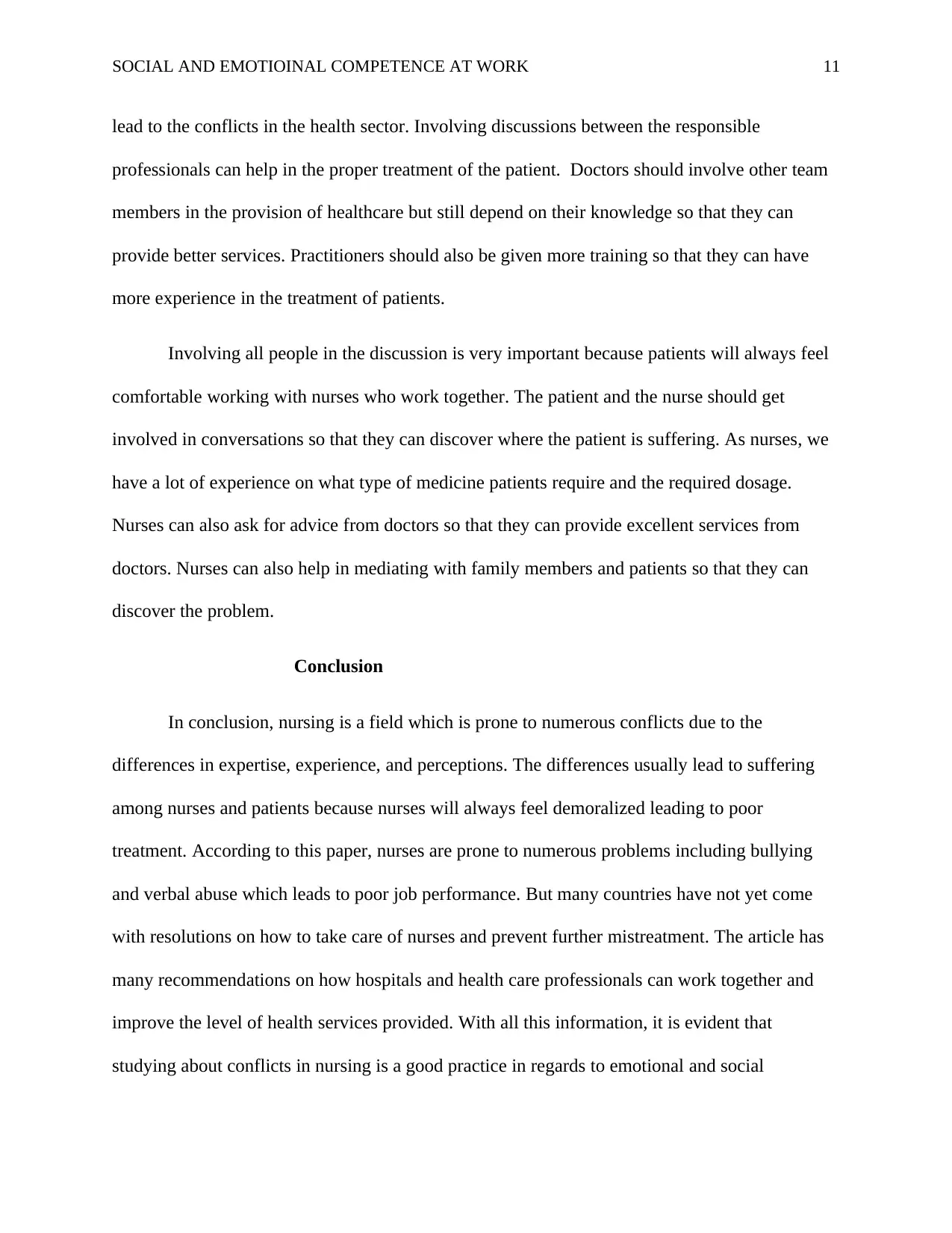
SOCIAL AND EMOTIOINAL COMPETENCE AT WORK 11
lead to the conflicts in the health sector. Involving discussions between the responsible
professionals can help in the proper treatment of the patient. Doctors should involve other team
members in the provision of healthcare but still depend on their knowledge so that they can
provide better services. Practitioners should also be given more training so that they can have
more experience in the treatment of patients.
Involving all people in the discussion is very important because patients will always feel
comfortable working with nurses who work together. The patient and the nurse should get
involved in conversations so that they can discover where the patient is suffering. As nurses, we
have a lot of experience on what type of medicine patients require and the required dosage.
Nurses can also ask for advice from doctors so that they can provide excellent services from
doctors. Nurses can also help in mediating with family members and patients so that they can
discover the problem.
Conclusion
In conclusion, nursing is a field which is prone to numerous conflicts due to the
differences in expertise, experience, and perceptions. The differences usually lead to suffering
among nurses and patients because nurses will always feel demoralized leading to poor
treatment. According to this paper, nurses are prone to numerous problems including bullying
and verbal abuse which leads to poor job performance. But many countries have not yet come
with resolutions on how to take care of nurses and prevent further mistreatment. The article has
many recommendations on how hospitals and health care professionals can work together and
improve the level of health services provided. With all this information, it is evident that
studying about conflicts in nursing is a good practice in regards to emotional and social
lead to the conflicts in the health sector. Involving discussions between the responsible
professionals can help in the proper treatment of the patient. Doctors should involve other team
members in the provision of healthcare but still depend on their knowledge so that they can
provide better services. Practitioners should also be given more training so that they can have
more experience in the treatment of patients.
Involving all people in the discussion is very important because patients will always feel
comfortable working with nurses who work together. The patient and the nurse should get
involved in conversations so that they can discover where the patient is suffering. As nurses, we
have a lot of experience on what type of medicine patients require and the required dosage.
Nurses can also ask for advice from doctors so that they can provide excellent services from
doctors. Nurses can also help in mediating with family members and patients so that they can
discover the problem.
Conclusion
In conclusion, nursing is a field which is prone to numerous conflicts due to the
differences in expertise, experience, and perceptions. The differences usually lead to suffering
among nurses and patients because nurses will always feel demoralized leading to poor
treatment. According to this paper, nurses are prone to numerous problems including bullying
and verbal abuse which leads to poor job performance. But many countries have not yet come
with resolutions on how to take care of nurses and prevent further mistreatment. The article has
many recommendations on how hospitals and health care professionals can work together and
improve the level of health services provided. With all this information, it is evident that
studying about conflicts in nursing is a good practice in regards to emotional and social
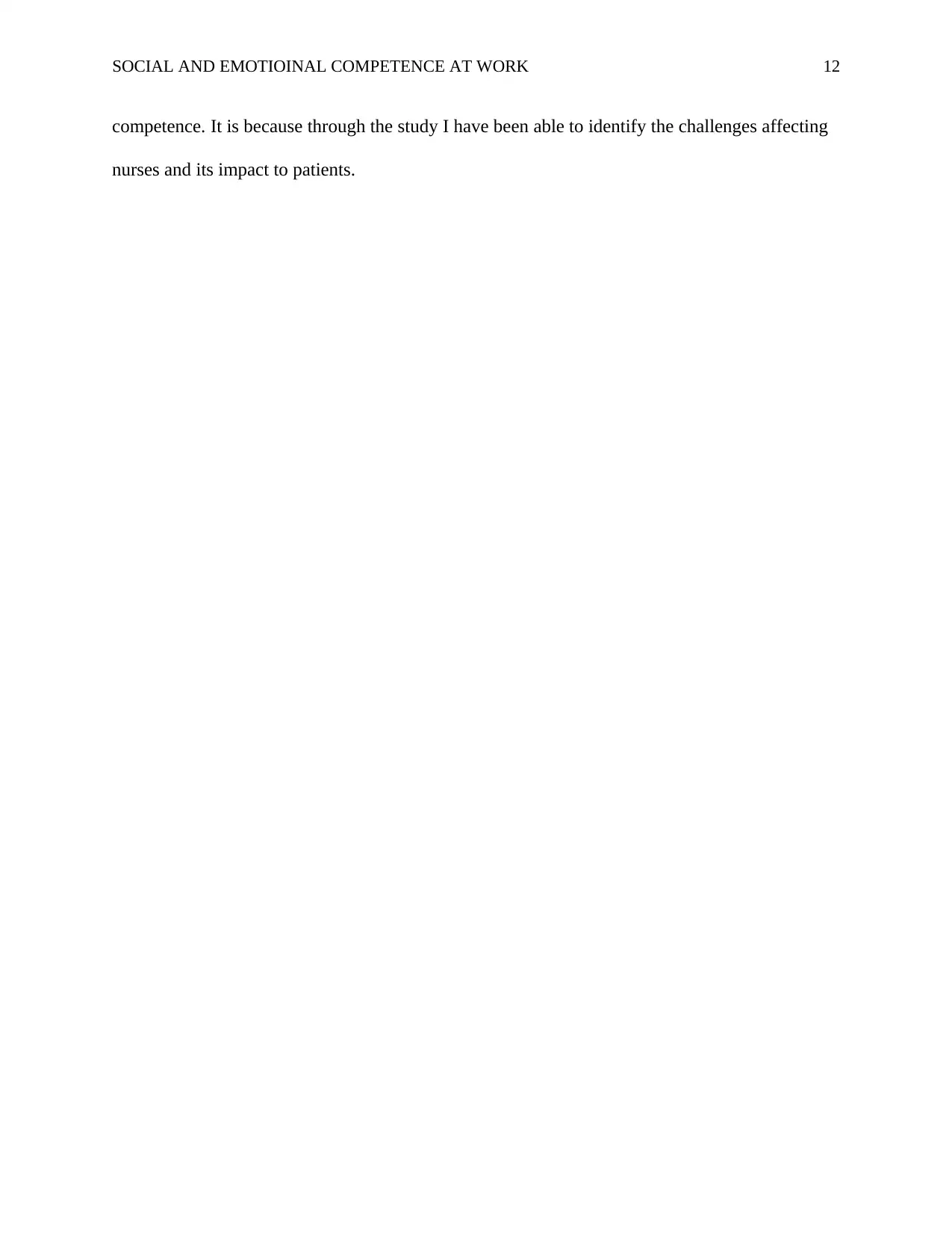
SOCIAL AND EMOTIOINAL COMPETENCE AT WORK 12
competence. It is because through the study I have been able to identify the challenges affecting
nurses and its impact to patients.
competence. It is because through the study I have been able to identify the challenges affecting
nurses and its impact to patients.
⊘ This is a preview!⊘
Do you want full access?
Subscribe today to unlock all pages.

Trusted by 1+ million students worldwide
1 out of 14
Related Documents
Your All-in-One AI-Powered Toolkit for Academic Success.
+13062052269
info@desklib.com
Available 24*7 on WhatsApp / Email
![[object Object]](/_next/static/media/star-bottom.7253800d.svg)
Unlock your academic potential
Copyright © 2020–2026 A2Z Services. All Rights Reserved. Developed and managed by ZUCOL.




